Cancer doesn’t have a single cause, and there’s no universal shield against it. But over the years, researchers have built a clearer picture of how certain behaviors may play a role in cancer prevention. Some risk factors are out of our control – like genetics or age – but others can be shaped by how we live day to day.
Modifiable Influences on Cancer Risk
A number of everyday choices are now recognized as potential contributors to either raising or reducing cancer risk. While no habit guarantees protection, shifting some behaviors may tilt the odds in your favor. Among the better-known factors:
- tobacco exposure – still considered the leading preventable cause of cancer worldwide;
- sun exposure – particularly relevant for skin cancers, where protective clothing and sunscreen use can make a measurable difference;
- alcohol intake – even moderate consumption has been linked with certain cancers;
- obesity and inactivity – tied to a range of cancers, including those of the breast, colon, and pancreas.
Movement and Metabolism
Regular physical activity doesn’t have to mean gym memberships or marathon training. Brisk walks, time in the garden, or dancing in the kitchen all count. The key is consistency. Studies suggest that staying active may help regulate hormone levels, reduce inflammation, and support immune health – all of which matter in the context of cancer.
Food Patterns That Matter
Diet, too, has its role. A pattern that emphasizes fiber-rich vegetables, legumes, nuts, and whole grains – while limiting processed meats and refined sugars – has been associated with lower incidence of several cancers. Some evidence also supports plant-heavy diets in reducing inflammation and oxidative stress in the body.
The Role of Cancer Screening
Behavior alone isn’t the whole story. Regular cancer screening and early oncology detection remain essential. They don’t prevent cancer outright – but they can increase the chance of catching it early, when treatment tends to be more successful and less invasive.
The Goal to Reduce Cancer Risk: Why Awareness Is a Starting Point
None of these adjustments are easy for everyone, and not all of them may apply to each person equally. But when done gradually and with purpose, small shifts often lead to larger gains. Over time, they can become protective habits.Feel free to send us a request through our website, and we’ll match you with a highly qualified specialist who fits your specific needs. We work closely with leading professionals across a broad range of oncology institutions to help ensure you receive the expert care you deserve.
Shenzhen Genoimmune Medical Institute (GIMI)
The Shenzhen Geno-Immune Medical Institute (GIMI) stands at the forefront of gene and immune cell therapy, pioneering innovative solutions beyond FDA-approved CAR-T treatments. Led by renowned expert Prof. Lung-Ji Chang, inventor of the widely-adopted lentiviral vector system, GIMI has delivered effective treatments for over 1,000 cancer cases with cutting-edge 4th generation CAR-T technologies.
What are 5 ways to prevent cancer?
Avoid tobacco, maintain a healthy weight, stay physically active, eat a nutrient-dense diet, and attend regular cancer screenings.
How can an active lifestyle reduce cancer?
Movement helps regulate hormones, reduces inflammation, and supports a stronger immune response – factors tied to lower cancer risk.
How is cancer being prevented?
Through a mix of public health measures (like vaccination and tobacco control), clinical screening programs, and personal behavior changes that reduce known risks.











